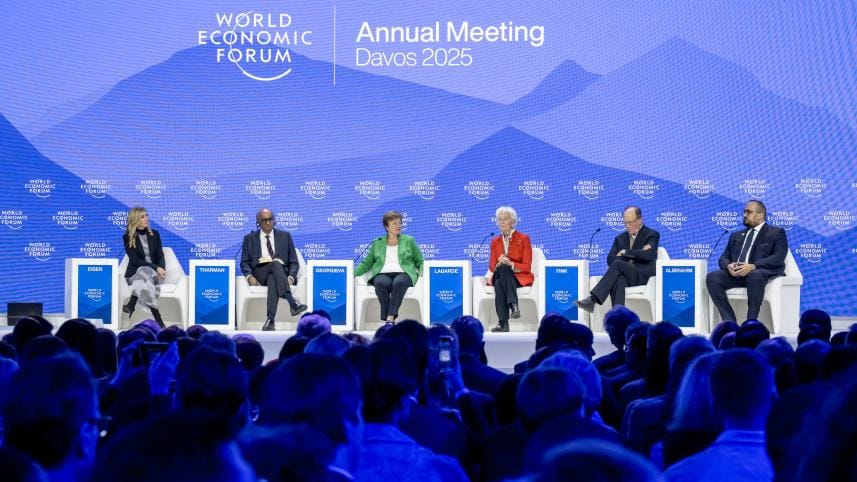Davos presents elites with economic Rorschach Test

It's become something of a cliché for delegates at the World Economic Forum's annual meeting to quiz each other about "the mood in Davos". The nearly 3,000 political leaders, executives, financiers, and policymakers who descended on the Swiss mountain resort last week offered differing answers to that theme. Given it coincided with Donald Trump being sworn in for his second term, Davos presented the global elites with an economic Rorschach Test.
Much like the psychological exam that logs a subject's perceptions of inkblots, the US president divided opinion. Business leaders and top bankers in Davos were eager to praise the Trump administration's promises to lower taxes and sweep away excessive regulations. Some lined up to congratulate the commander-in-chief, perhaps conscious that they missed his inauguration, where tech leaders including Apple's
Tim Cook and Mark Zuckerberg of Meta Platforms were seated in front of the president's cabinet nominees.
Yet Brian Moynihan on Thursday learned the limits of obsequience. In front of a packed crowd in the Davos Congress Hall, the Bank of America boss received a public dressing down from Trump. Speaking by video link, the president repeated unfounded accusations that the bank and its large rivals refuse to open accounts for conservatives. "What you're doing is wrong," he said. Moynihan responded by promising to sponsor the 2026 World Cup.
Behind closed doors, investors pointed out that Trump's plans to lower taxes, impose tariffs on US exports and deport illegal immigrants would push up inflation, raising interest rates and testing high share prices. Some believe the threat of a selloff will restrain the president. After all, "his main key performance indicator is the S&P 500 Index," one senior banker observed.
Other global financiers mused on how the president might attempt to cut a grand bargain with China to shrink the trade deficit as an alternative to imposing sanctions. They mapped out a contrarian path to strong returns in the People's Republic, supported by Beijing's own measures to stimulate the world's second-largest economy. Chinese investors were more despondent, arguing that Trump's security hawks would pull him back from any such deal.
Some in the cryptocurrency industry, which supported the Republican Party last year in the hopes of receiving more supportive regulation, expressed dismay at Trump's decision to launch his own crypto token days before his inauguration. Anthony Scaramucci, who briefly served as White House communications adviser in Trump's first term, said the move would make it harder for the administration to push through new crypto-friendly rules.
Policymakers meanwhile fretted that Trump's early actions, which included pardoning hundreds of jailed supporters who participated in the attack on the US Capitol four years earlier, will chip away at public faith in law and order. Muhammad Yunus, the Nobel laureate who is leading Bangladesh's government after protests forced out the previous prime minister, told Reuters Breakingviews that the upheaval in his country demonstrated the dangers of sycophantically praising politicians who pursue headline GDP growth without much thought about the consequences.
Executives who have committed to green energy projects hoped that renewable power could withstand Trump's pro-fossil fuel stance, and his rallying call for the world to pump more oil. They also warned of potential lawsuits if the US withdraws incentives promised by the Inflation Reduction Act.
Acknowledgement of U.S. economic strength was mirrored by deep gloom surrounding Europe. Senior executives contrasted deregulation stateside with the thicket of financial, environmental, and planning rules that companies must navigate in the European Union. Yet some expressed hope that the Trump administration, which European Central Bank President Christine Lagarde described as an "existential threat", would force a response.
Ursula von der Leyen, the president of the European Commission, told the Davos crowd she would sweep away unnecessary regulations and introduce a so-called "28th regime" which would allow innovative companies to operate across all 27 EU countries under a single set of rules. The idea isn't entirely new. Still, on Friday Larry Fink of BlackRock, the world's largest asset manager, declared it was "probably time to be investing" in Europe again.
The other recurring theme at the panels, bilateral meetings, discreet dinners, and private concerts was artificial intelligence. AI experts marvelled at the speed at which large-language models are improving, including one developed by Chinese startup DeepSeek. Bankers and tech firms talked excitedly of the vast investments being made in data centres, although a mooted $500 billion plan for digital infrastructure unveiled last week by Trump appeared to be more hot air than hardware.
At the same time, many companies are beginning to roll out AI agents: digital assistants trained on historical data to perform administrative tasks. Senior executives at financial and IT services firms predicted that these agents would eventually handle much of the work currently done by junior accountants, creative teams, radiologists, and coders.
The exponential rise in efficiency and productivity will force companies to fundamentally rethink their revenue models and how many days people work, though the Davos crowd appeared less interested in the implications for the distribution of income, nor the steps governments might need to take to mitigate the expected fallout. As one executive told Reuters Breakingviews: "Companies don't like to talk about it in public".
Ultimately, the Davos elite remain keen to see the glass as half full. Some attendees pointed to a potential surprise upside from a Trump presidency: rational regulation, an end to wars in Europe and the Middle East, and a trade and security détente with China that could prevent the global economy from further fragmenting. Of course, as Hermann Rorschach knew, the interesting thing about staring at an inkblot is what it reveals about its observer.



 For all latest news, follow The Daily Star's Google News channel.
For all latest news, follow The Daily Star's Google News channel.
Comments